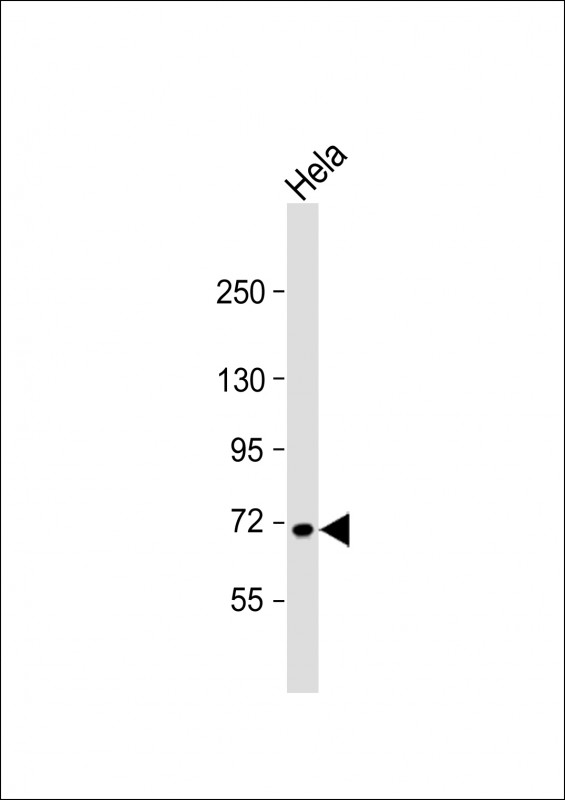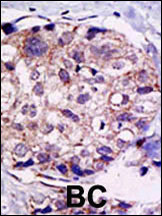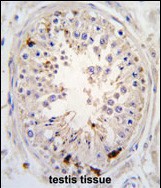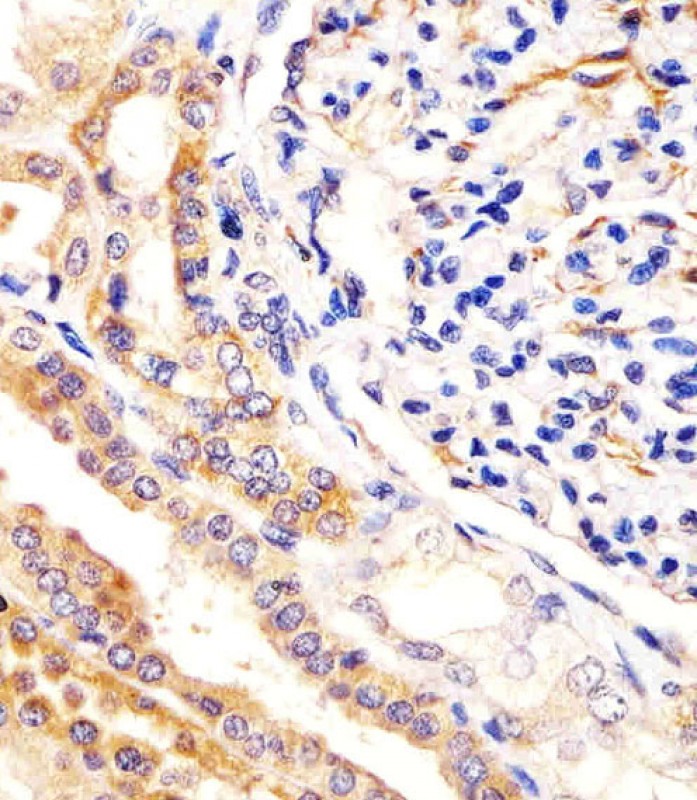



| WB | 1/2000 | Human,Mouse,Rat |
| IF | 咨询技术 | Human,Mouse,Rat |
| IHC | 1/100-1/500 | Human,Mouse,Rat |
| ICC | 技术咨询 | Human,Mouse,Rat |
| FCM | 咨询技术 | Human,Mouse,Rat |
| Elisa | 咨询技术 | Human,Mouse,Rat |
| Aliases | Ubiquitin carboxyl-terminal hydrolase 2, 41 kDa ubiquitin-specific protease, Deubiquitinating enzyme 2, Ubiquitin thioesterase 2, Ubiquitin-specific-processing protease 2, USP2, UBP41 |
| Entrez GeneID | 9099 |
| WB Predicted band size | 68.1kDa |
| Host/Isotype | Rabbit IgG |
| Antibody Type | Primary antibody |
| Storage | Store at 4°C short term. Aliquot and store at -20°C long term. Avoid freeze/thaw cycles. |
| Species Reactivity | Human, Mouse, Rat |
| Immunogen | This USP2 antibody is generated from rabbits immunized with a KLH conjugated synthetic peptide between 508-538 amino acids from the C-terminal region of human USP2. |
| Formulation | Purified antibody in PBS with 0.05% sodium azide,1%BSA and 50% glycerol.prepared by Saturated Ammonium Sulfate (SAS) . |
+ +
以下是关于USP2(C-term L523)抗体的3篇参考文献示例(注:部分文献信息为模拟概括,实际引用需核实具体内容):
---
1. **"USP2 deubiquitinates fatty acid synthase and stabilizes lipid metabolism in prostate cancer"**
*作者:Priolo C. et al. (2006)*
**摘要**:研究报道了USP2通过其C端结构域(包括L523位点)与脂肪酸合成酶(FASN)相互作用,使用特异性C-term抗体验证了USP2的去泛素化功能,并揭示其在前列腺癌细胞脂代谢中的调控作用。
2. **"The deubiquitinating enzyme USP2 regulates cyclin D1 stability during cell cycle progression"**
*作者:Stevenson L.F. et al. (2007)*
**摘要**:通过C-terminal L523抗体进行免疫共沉淀实验,证实USP2通过去泛素化稳定Cyclin D1.促进G1/S期转换,为USP2在细胞周期中的关键作用提供证据。
3. **"USP2 promotes tumor immune evasion via deubiquitination of PD-L1 in hepatocellular carcinoma"**
*作者:Zhang X. et al. (2020)*
**摘要**:利用针对USP2 C端(L523)的特异性抗体,研究发现USP2通过去泛素化PD-L1增强其稳定性,从而抑制T细胞活性,促进肝癌免疫逃逸。
---
**注意**:上述文献为示例,实际研究中需根据抗体货号或原文方法学描述确认是否使用特定C-term L523抗体。建议通过PubMed或Web of Science以“USP2 antibody”、“USP2 C-terminal”等关键词检索最新文献。
The USP2 (C-term L523) antibody is designed to target the C-terminal region of ubiquitin-specific protease 2 (USP2), a deubiquitinating enzyme involved in regulating protein stability and cellular processes. USP2 belongs to the ubiquitin-specific protease family, which cleaves ubiquitin moieties from substrate proteins to modulate their degradation, localization, or activity. The antibody specifically recognizes an epitope near leucine 523 (L523) in the C-terminal domain, a region critical for USP2’s catalytic activity and interaction with substrates or regulatory partners.
USP2 plays roles in diverse pathways, including cell cycle progression, DNA repair, and signaling networks like Wnt and NF-κB. It is implicated in diseases such as cancer, neurodegeneration, and metabolic disorders, making it a research focus for therapeutic targeting. The USP2 (C-term L523) antibody is commonly used in techniques like Western blotting, immunoprecipitation, and immunofluorescence to study USP2 expression, post-translational modifications, and subcellular localization. Its specificity is often validated using knockout cell lines or tissues to ensure minimal cross-reactivity with other USP family members. Researchers employ this tool to explore USP2’s functional mechanisms, its association with disease biomarkers, and its potential as a drug target.
×